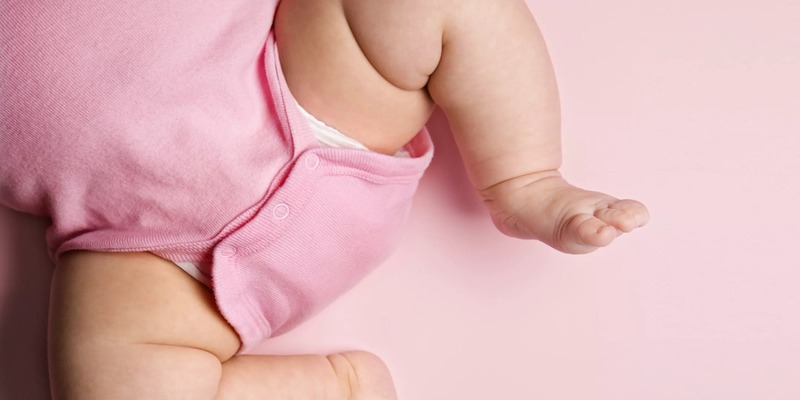Is It Safe To Have A Bigger Baby? Gaining Weight as a Baby
Nov 15, 2023 By Madison Evans
Your new baby might be short and mushy or tall and slender. Babies, like grownups, can be any number of sizes. However, you may question if you've heard more than a few casual remarks regarding your baby's Weight. Is there a problem with so many rolls? Is it possible that your infant has an unhealthy amount of baby fat? What you need to know about babies' development and weight gain.
Are Chubby Newborns Healthy?

Babies born with full, rounded cheeks and chubby, smoothable thighs are often healthy. How much Weight a baby gains and how they carry it may be cute and concerning, depending on several factors. The first year of a newborn's life is a time of rapid development.
A full-term male infant typically weighs 7 pounds, 6 ounces at delivery. Female infants typically weigh 7 pounds, 2 ounces at birth on average. However, many healthy newborns are either lighter or heavier than this norm.
Babies of the same birth weight might appear either short and plump with few rolls or long and slim with more slender features. The presence or absence of "baby fat" in a child is not usually determined only by their Weight.
Baby Weight Growth Is Normal
Babies can gain up to three times their birth weight by age one. Newborns' rapid growth and development necessitate a high-fat diet for all babies. This explains why your infant never appears satisfied. Babies keep part of their excess fat under their skin for instant energy since their rapidly growing bodies and brains require it constantly.
Some babies are born with fat rolls on their bellies or huge, chubby cheeks. This "fat" is rather good for your baby. Each infant develops at its own pace. Remember that babies don't necessarily develop or gain weight every week. What matters is how quickly they are expanding as a whole.
There Is A Height-Weight Range
Despite appearances, your squishy infant is quite healthy. The length of your kid is also important in determining how much weight she should have. No matter how "chunky" your kid may seem, as long as their weight is appropriate for their height, they are at a healthy weight.
Your kid may be on the higher end of the healthy weight range, but even so, they are still healthy. Your baby's physician will use an infant growth chart to measure their height and Weight. Babies are all assigned percentiles.
If your son is six months old and in the 98th percentile for Weight for his length, he weighs more than 98% of other infants his age and height. If your infant is gaining weight and developing normally during their first year, they are perfectly well. Don't panic if you feel you can no longer hold your child safely because of their Weight.
Your little one will start to shed some of that adorable "baby fat" after they achieve crawling and, subsequently, walking. The baby's weight distribution should become even more even as the toddler develops into a more active stage.
Is It A Problem If A Baby Is Born Too Heavy?

Babies' rapid weight increase is still a potential health risk today. Harvard University researchers have shown that newborns who acquire too much weight in their first two years have an increased risk of health issues. For this reason, it is crucial to monitor progress over time and set a reasonable annual growth target.
This 2018 analysis of data suggests that fast infant weight gain may increase the risk of later obesity in both children and adults. In the United States, by age 6, around one-fifth of children are already overweight or obese.
About half of all obese children were already overweight by age 2. Overweight and obese children and adults have an increased risk of developing cardiovascular disease, diabetes mellitus type 2, and other serious conditions.
Why Are Some Infants Heavier Than Others?
Many variables affect a baby's birth weight and rate of weight increase. It's not in your power to change everything. A child's height and Weight may be determined by their parents' genetics.
In pregnancy, a mother may affect her baby's Weight by what she eats and how active she is. Babies born to mothers with excess Weight, obesity, smoking, or gestational diabetes are more likely to be overweight.
Furthermore, studies conducted in 2019 suggest that infants whose births were facilitated by scheduled C-sections may be at a higher risk of developing obesity later in life. They may have a different gut flora composition than kids born the traditional way. Babies often gain Weight for reasons other than having a C-section.

A Comprehensive Guide to Dealing With a Pinched Nerve

The Ultimate Guide to the Best Cardio Workouts for Weight Loss

Buffalo Meat: Evaluating Its Health Contributions

A Manual to Deal With Psychological Projection

What are the signs of coming to the end of menopause?

Reflection: The Role of Reflective Practice in Healthcare Professions

Exploring the Link Between Psoriasis and Cancer: New Study Insights

How Does Pustular Psoriasis Appear

Cultivating Better Sleep: 10 Healthy Habits

Is It Safe To Have A Bigger Baby? Gaining Weight as a Baby

Understanding Fat Storage and Energy Conversion in the Human Body
